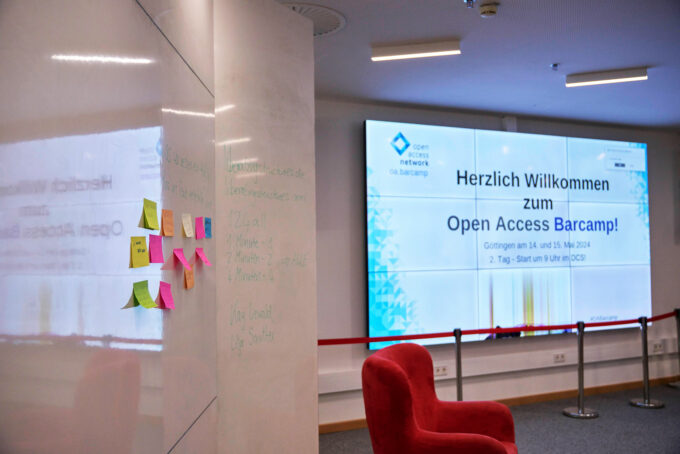
Open Science in Economics: Selected Findings From the ZBW Awareness Analysis 2022
There is generally great enthusiasm for Open Science and Open Practices in library circles. But what is actually the situation at German higher education institutions? Following a survey in 2019, the ZBW went in search of answers from researchers in economics and business studies once again in 2022.
by Doreen Siegfried

From 1 March to 10 May 2022, the ZBW – Leibniz Information Centre for Economics carried out a wide-ranging awareness analysis among economics and business studies researchers. 401 researchers were surveyed online in a targeted way with a layered test sample of ten defined subgroups. The aim was to get a representative image of the total population of scientifically working people in the field of business studies and economics – both in terms of status groups and specialist discipline. Research assistants and professors from the fields of economics and business administration at universities, universities of applied sciences (UoAS) and non-university research institutions in Germany were surveyed.
Part of the representative study deals with the topic of Open Science. We have summarised selected findings that are not specific to ZBW here.
Open Science: general relevance in economics and business studies research
Question: Research funding organisations (for instance the German Research Foundation, the Federal Ministry of Education and Research and the EU) are increasingly more urgently demanding free access to academic publications and research data from funded projects (keyword: Open Science) (German). Open Science includes for instance Open Access Publications, Open Research Data and disclosure of the entire research process. Has academic policy already had an impact on your work?
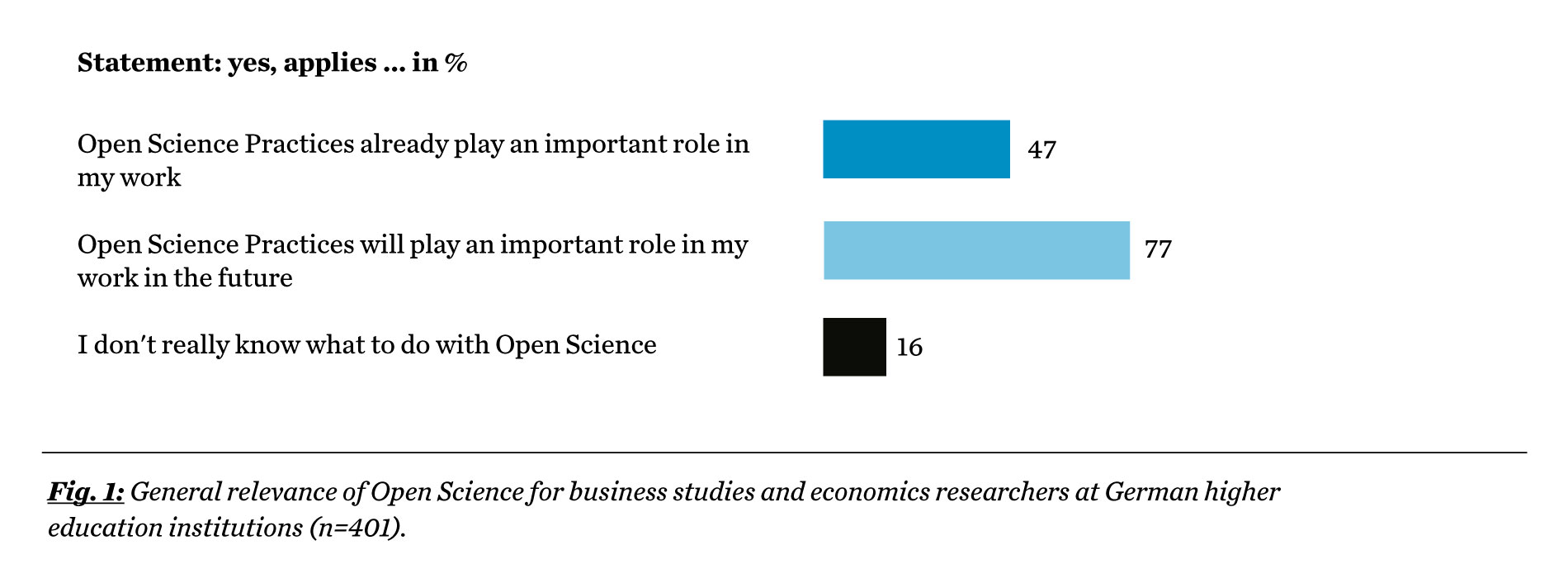
Of all of the parties surveyed, 47 percent said that Open Science currently already plays an important role in their work. 77 percent believe that Open Science will play an important role in the future. Only 16 percent can’t really relate to Open Science (see Fig. 1).
Taking a look at the ZBW 2019 Open Science Study (PDF, German), the proportion of business studies and economics researchers who are unaware of the term ‘Open Science’ has reduced slightly. In 2019, one in five business studies and economics researchers had never heard of the term “Open Science” before.
Looking at the different subgroups, the following picture emerges (see Fig. 2):
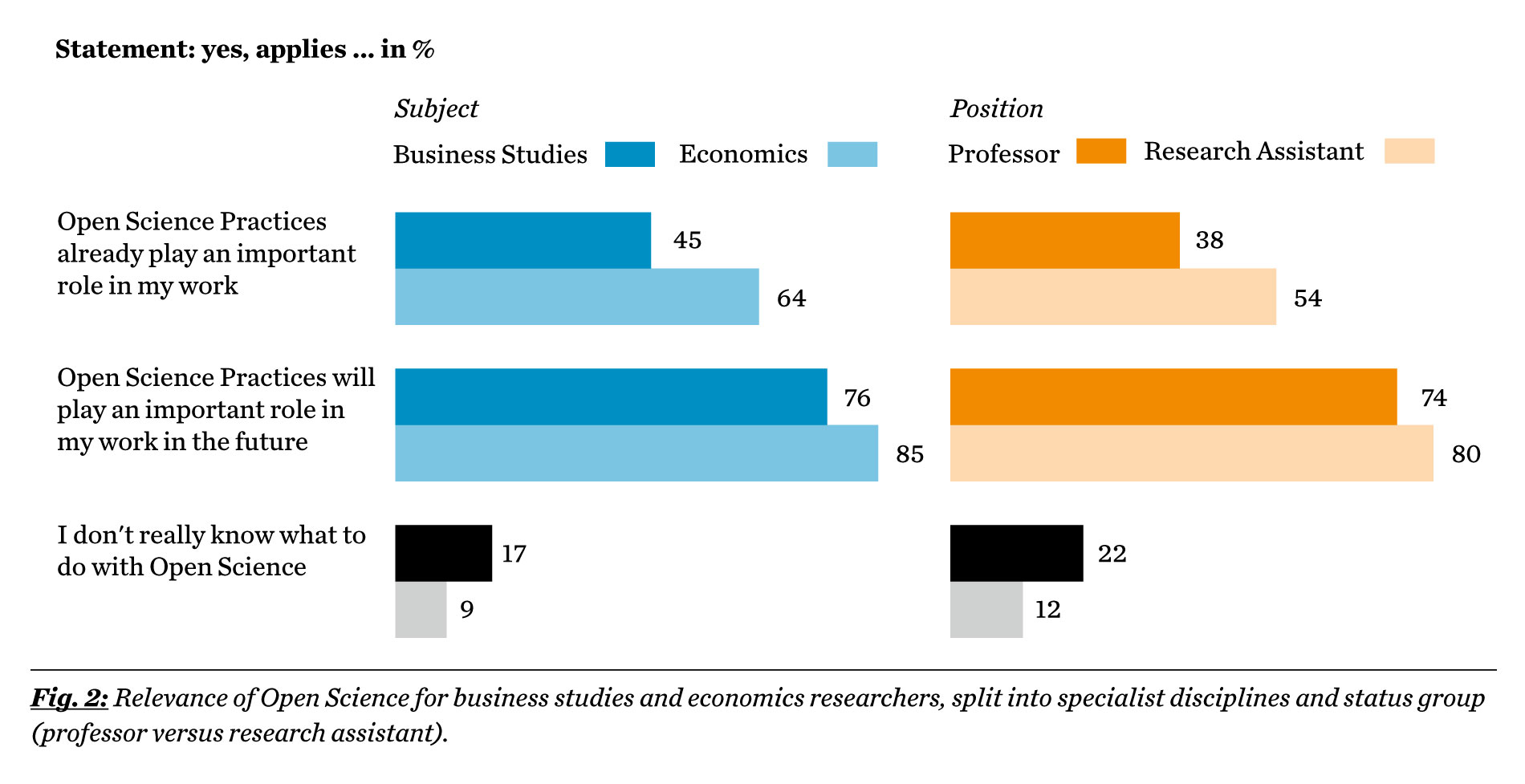
In economics, Open Science already plays an important role in the current work routine for almost two thirds (64 percent) of those surveyed. By contrast, this figure is less than a half for business administration at just 45 percent. The picture is also similar for future projections: whereas 85 percent of economics academics say that Open Science will play a role for them in the future, this figure is just 76 percent for business administration academics. As a logical consequence of this is that fewer economists have no connection to the topic of Open Science (9 percent) compared to business economists (17 percent).
There are also disparities between the status groups. Open Science already plays a more important role for research assistants than for professors (54 percent) and will also do so in the future (80 percent), where 38 percent of professors consider Open Science to play an important role now, and 74 percent believe that it will do so in the future. Regarding status groups, research assistants can relate to the topic of Open Science better than professors (see Fig. 2).
Relevance of Open Science Practices
Question: How important are the following Open Science Practices for you personally and/or your own academic work? This includes the use of openly shared research and actively sharing own research?
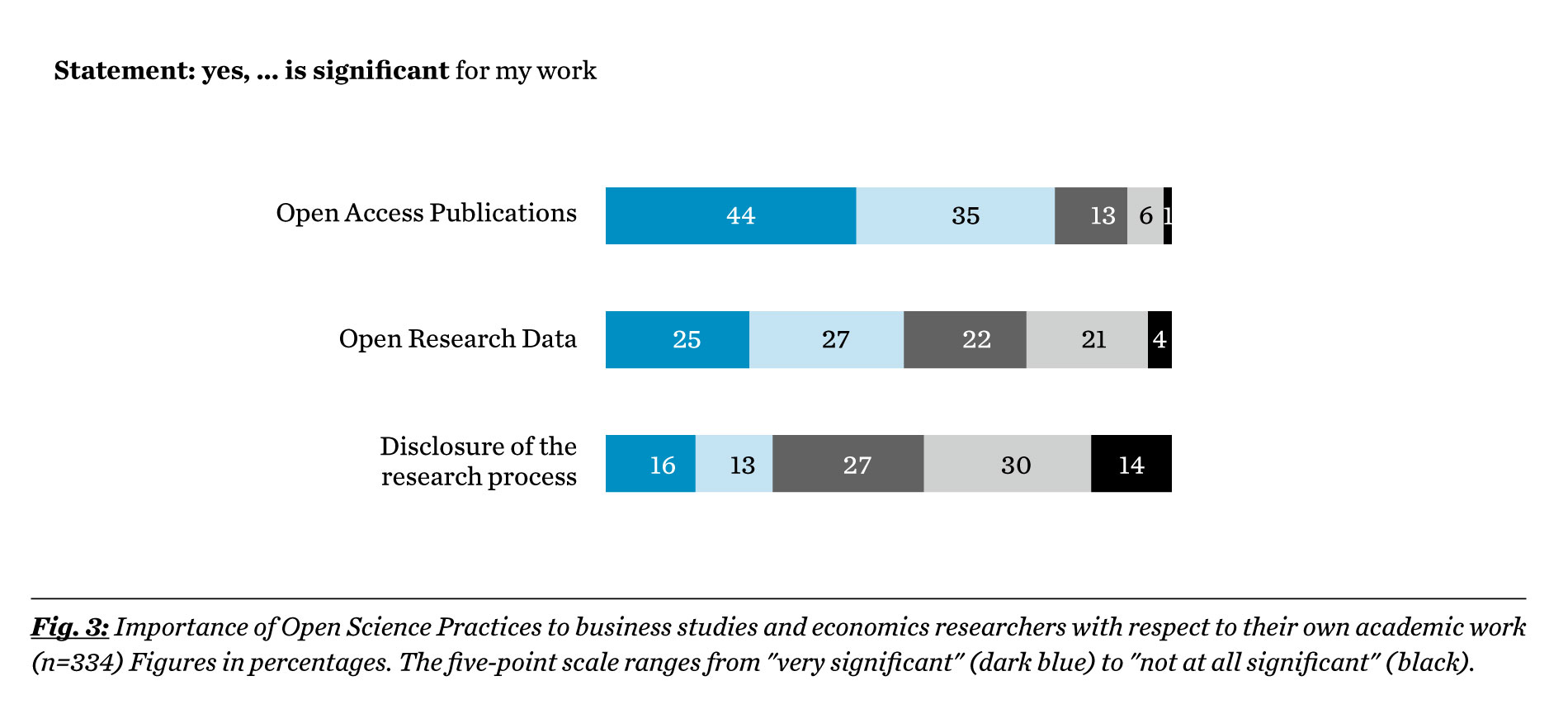
The researchers who rated Open Science as important now and in the future (see Fig. 1) were asked how important specific Open Science Practices are to them. Open Access Publications play the most important role – they are very important to 44 percent of those surveyed and fairly important to 35 percent.
The ZBW 2019 Open Science Study already showed that Open Access plays a very important role for business studies and economics researchers, scoring an average of 2.5 on a scale of 1=very important role to 5=no role at all. In 2019, 23 percent of economists in Germany confirmed that the concept of Open Access played a very important role. Furthermore, in 2019, 62 percent considered Open Access to be important for them personally. In 2022, this figure was 79 percent.
Open Research Data (see Fig. 3) also seemed to be key for business studies and economics researchers. Open Research Data is a very important topic for a quarter of those surveyed and fairly important for another quarter (27 percent) – open research data thus plays a role for 52 percent of those surveyed. Let’s compare this with the findings of 2019: the fact that research data is provided and published in line with open principles played a very important role for 11 percent and a fairly important role for 31 percent in the year 2019. That is 42 percent combined, meaning the importance of it has increased compared to 2019.
Disclosing the research process is very important for 16 percent of those surveyed and fairly important for 13 percent, meaning a total of 29 percent find it to be important. This is less than a third of those surveyed. For the majority, disclosing the research process currently does not play a key role.
Open Science Services: importance for business studies and economics researchers
Question: And what about the following services in the field of Open Science…how important are these services for you personally?
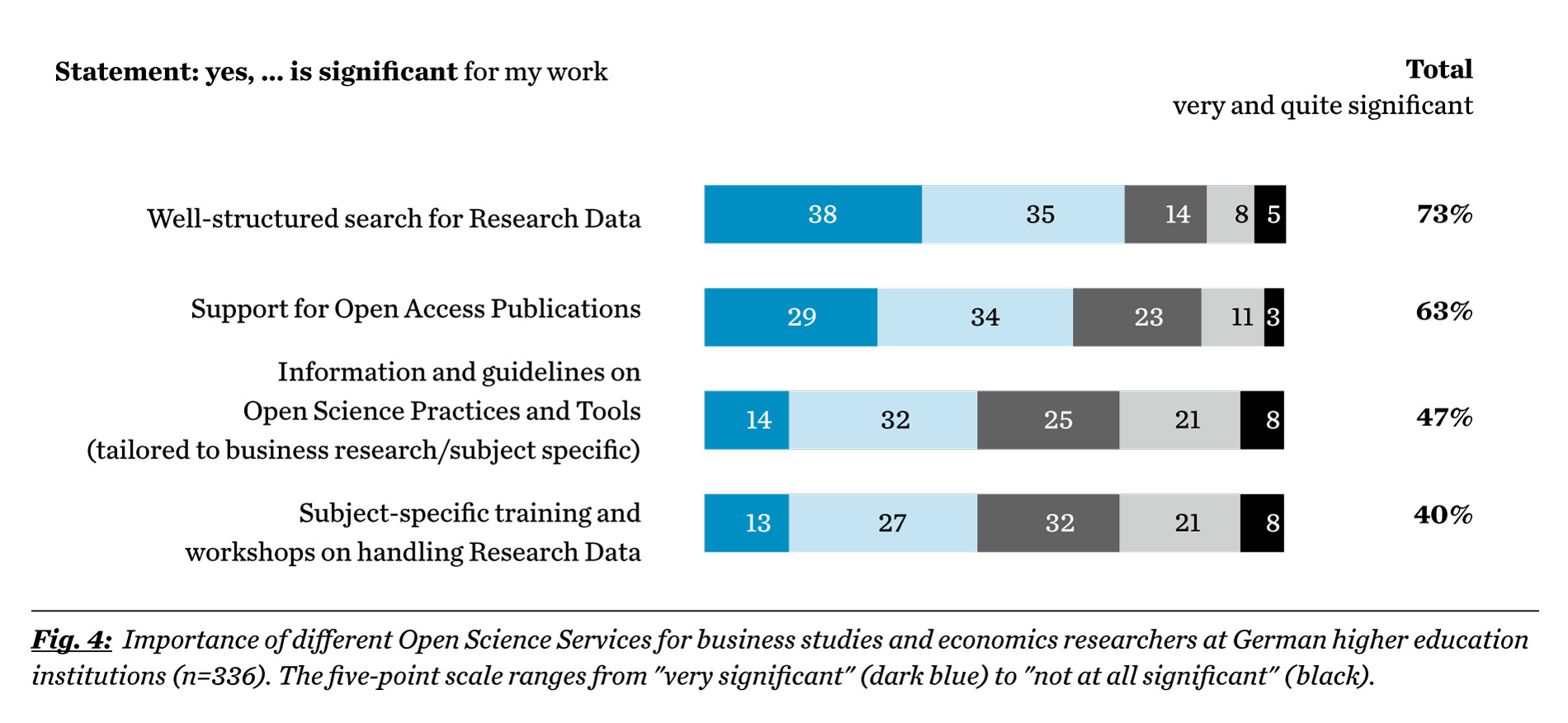
A well-structured search function for research data plays an important role for business studies and economics researchers. 38 percent find it very important, a further 35 percent find it fairly important – a total of 73 percent, almost three quarters of all those surveyed in all specialist disciplines. By way of comparison, the ZBW 2019 Open Science Study showed similar values. At this time, 77 percent of all people working in business studies and economics wanted information on how to locate Open Research Data more easily.
The ZBW’s 2022 awareness study also shows that the support in locating Open Access Publications is very important for 29 percent and fairly important for 34 percent. The 63 percent in total shows the relevance of this field. Comparing to 2019 again, 76 percent wanted information on Open Access Publication three years ago.
Subject-specific information and guidelines on Open Science Practices currently seem to be relevant for 47 percent in total, that is almost half of all those surveyed. 14 percent find it to be very relevant; 32 percent find it to be fairly relevant. By way of comparison, over three quarters of economics researchers wanted an overview of platforms, tools and applications that support Open Science Practices in 2019. These figures indicate that this need is diminishing.
Tangible subject-specific seminars and workshops on how to handle Research Data represent an exciting offer for two fifths of all those surveyed.
Open Science Services: use by business studies and economics researchers
Question: Have you already tangibly used these services in the field of Open Science
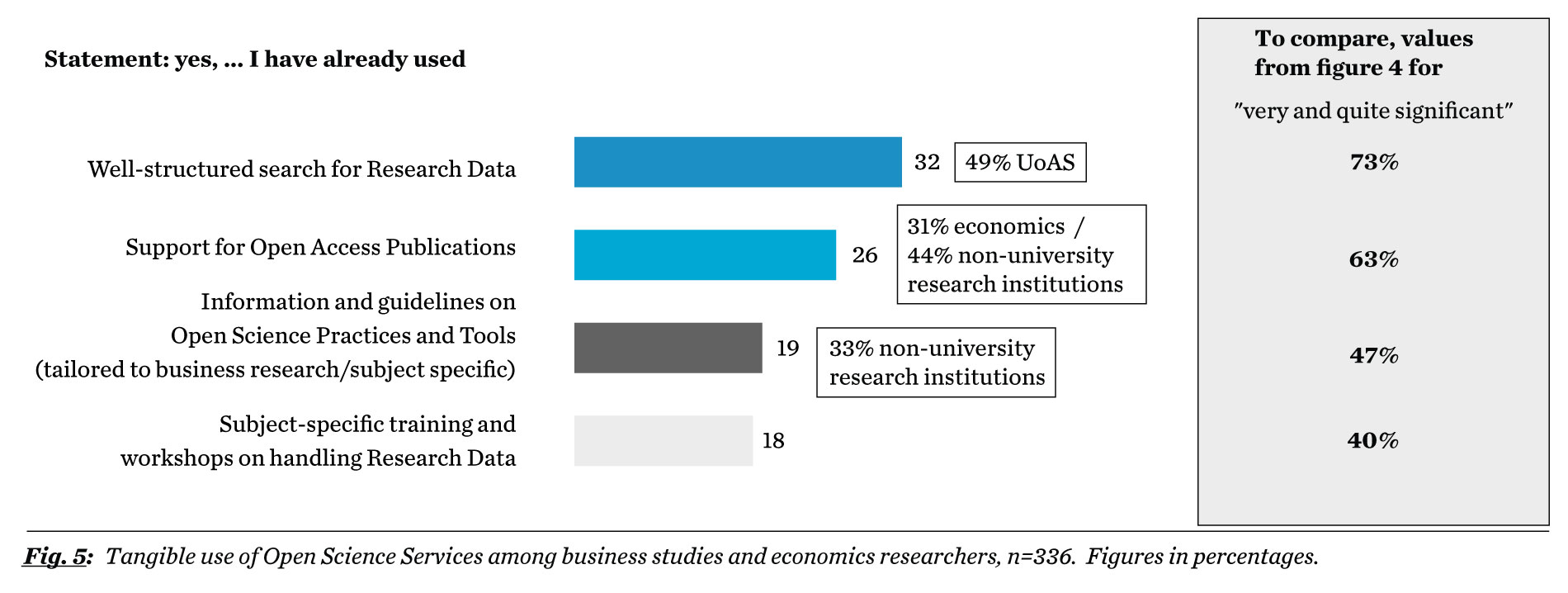
Let’s now take a look at the difference between the ascribed importance of Open Science Services and how they are used. Whereas 73 percent of those surveyed said that they find a well-structured search function for business studies economics research data important, only 32 percent said that they had already used such a search function. Among employees of universities of applied sciences, this figure was 49 percent.
Almost two thirds (63 percent) said that they find it important to have support for Open Access Publications. By contrast, less than a third (26 percent) use such a service – calculated based on all subgroups surveyed. Considering the subgroups, it is noticeable that 31 of economists and as many as 44 percent of researchers at non-university research institutions (usually economists too) have already tangibly used this kind of support at least once.
There is also a difference for subject-specific information und guidelines on Open Science Practices and Tools (see Fig. 4). A fifth (19 percent) of researchers use this offering – among researchers at non-university research institutions, this figure is a third (33 percent; see Fig. 5). Among those who find subject-specific seminars and workshops on how to handle Research Data important, half have also already used these kind of educational services.
Archiving publication and research data: trustworthiness of different providers
Question: With respect to archiving publications and research data, how trustworthy do you find the following providers?
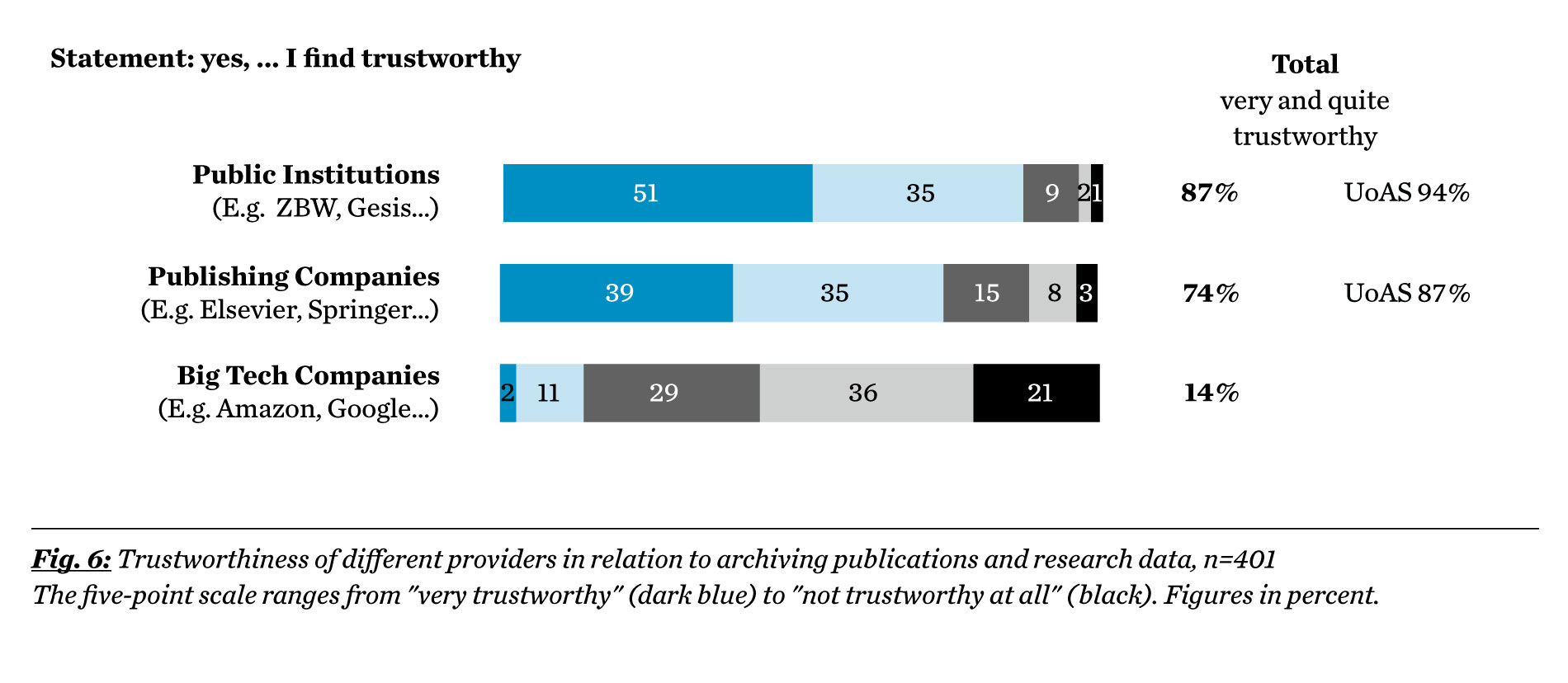
We then asked business studies and economics researchers in Germany how trustworthy they consider various archiving providers to be. Public institutions are the most trusted, with approval from 87 percent in total. It is interesting that this figure is even higher among employees at universities of applied sciences, where 94 percent trust public institutions. Publishers, including the publishing companies Elsevier and Springer, also enjoy a high level of trust at 74 percent. Around two fifths of all those surveyed (39 percent) said that they believe publishers to be very trustworthy and a further 35 percent believed them to be trustworthy. Here too, researchers at universities of applied sciences are ahead with 87 percent of them saying that they trust this group of providers. Big tech companies, on the other hand, are only trusted by 14 percent and 21 percent respectively, which is a fifth of business studies and economics researchers say that big tech companies are not trustworthy at all. Most of those surveyed answered “neither trustworthy or untrustworthy”.
Awareness of the German National Research Data Infrastructure
Question: The National Research Data Infrastructure (NFDI) should be used to systematically access, network, and secure academics and research databases – which are merely temporarily stored in a decentralised way today – in the long-term, while making these accessible across disciplines and throughout different countries. In one place. For the entire research system. It should be possible to easily locate and use many types of data (including social media data, representative population data and much more). NFDI development is module by module, through various consortia, on a subject-specific basis. In business studies and economics, such consortia include the Consortium for Business, Economic and Related Data (BERD@NFDI) and the Consortium for the Social, Educational, Behavioural and Economic Sciences (KonsortSWD). Have you heard of this NFDI project, or the BERD and/or KonsortSWD consortia?
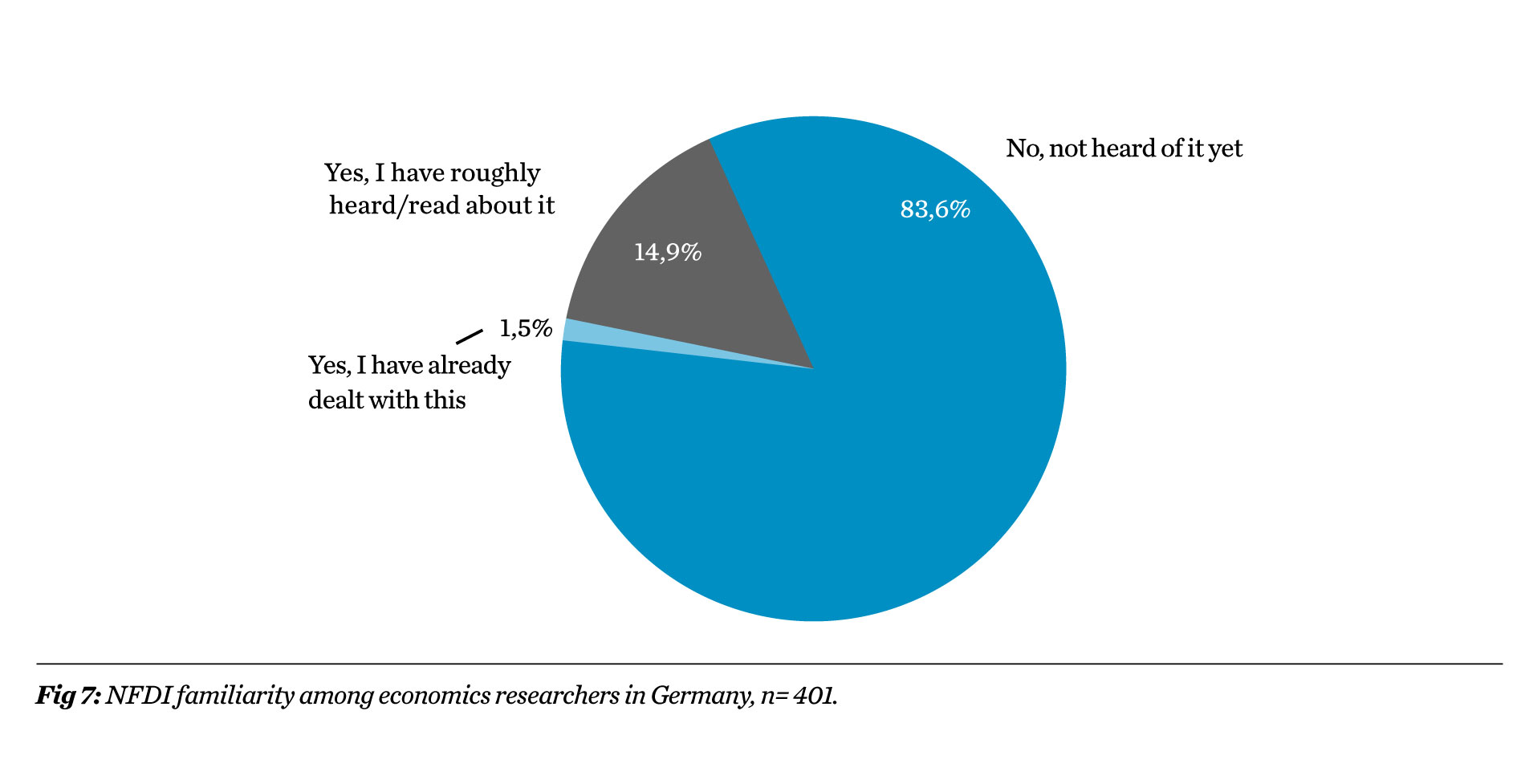
The NFDI pie chart is self-explanatory. The National Research Data Infrastructure (NFDI) is not very familiar yet. Then again, this is hardly surprising since these infrastructure projects are still in development.
NFDI: relevance to economists’ work
Question: How important will the new National Research Data Infrastructure (NFDI) and/or the two economics consortia BERD and KonsortSWD be in the future for your work?
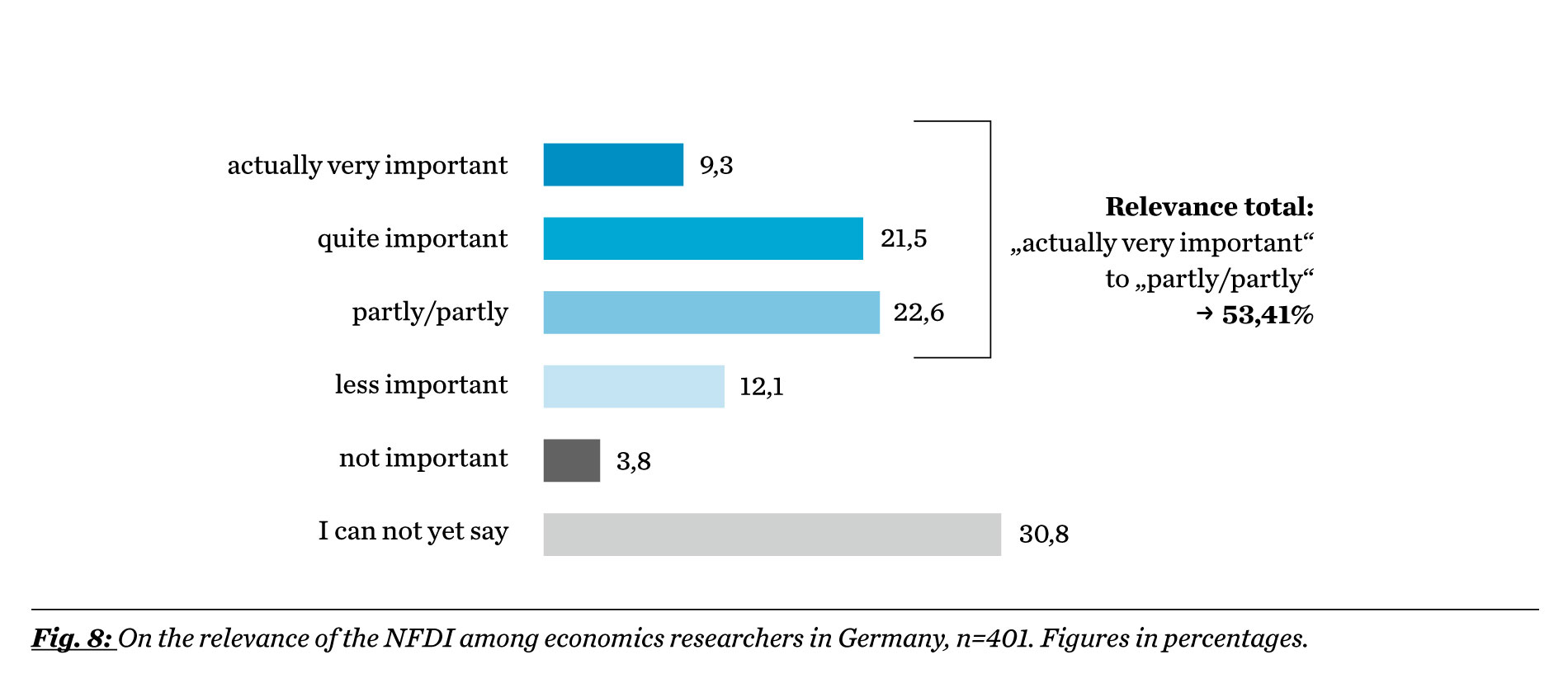
Compared to the current NFDI familiarity among economics researchers in Germany (see Fig. 7), its expected future importance and/or that of the two economics consortia BERD@NFDI and KonsortSWD is relatively high. Around half of those surveyed (53 percent) view it as relevant for their own work. The NFDI is actually very important for 9 percent (see Fig. 8). But as the NFDI is still unknown among 84 percent, a large proportion of those surveyed did not answer the question (31 percent). Only 4 percent are critical and say that the NFDI is not important to them.
The survey has shown that Open Science and the NFDI in particular are regarded as important or potentially important – but more likely in the future. It is the responsibility of the consortia to make their work and the progress made in developing their infrastructures transparent and well-known, and to communicate this on a continuous basis. Furthermore, the survey shows that the academic library work with publishers and/or publishing corporations needs to become the focus of communication.
Conclusion: status quo of Open Science in business studies and economics
So how can these findings be summarised? Has Open Science already made its mark on economists or has interest plateaued somewhat? In which areas should we – the library and Open Science community – now take action?
Not only research funding organisations but also top economics research journals are now demanding that academics share their data and codes. For this reason, there are numerous special research fields or post-graduate programmes that have integrated training in Open Science Practices into their curricula. It’s almost impossible to ignore the discussion surrounding Open Science. That’s why it is also not surprising that over three quarters of those surveyed believe that Open Science will play a major role in the future.
It is however very clear that younger researchers – that are research assistants – are more interested in Open Science than professors. An awareness of the need for future skills in academic work and a creative drive to change the research system (at least in part) combine to form a “young avantgarde”.
The high level of trust in publishing corporations is noteworthy. Critical scrutiny of power structures and independent community-owned infrastructures has not yet taken place to a sufficient degree.
Libraries can play a role here: it would be good if they could be vocal in communicating their own skills and services for networked and digitally independent academia. The times of libraries quietly working away unnoticed are definitely over.
This text has been translated from German.
This might also interest you:
- The Importance of Open Science in Economics: Report on the Results of an Online Survey Among Researchers in Economics at German Universities 2019 (PDF, German)
- Open Economics: Study on Open Science Principles and Practice in Economics
- One Year of Open Access: The Journals Wirtschaftsdienst and Intereconomics Take Stock
- Workshop: How to Make Open Science Practice Attractive in the Economic Sciences
Dr Doreen Siegfried is Head of Marketing and Public Relations at the ZBW – Leibniz Information Centre for Economics. She can also be found on LinkedIn and Twitter.
Portrait: ZBW©
View Comments

Open Letter: Open Science Should Provide Support, not Impose Sanctions
Following ZBW's Open Science Retreat on the impact of global crises on the Open...



